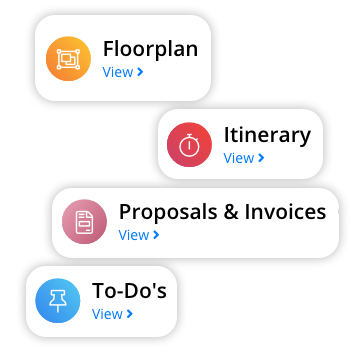6 key insights for finding the best event client portal software
The events industry has literally been around for centuries. Hence, it follows that, with such a long history, professionals in the events industry have come to rely on a set of older tools and processes for doing everything from creating proposal templates in Excel and drawing event designs by hand to billing clients by email and managing client relationships by phone.
However, change is as constant in the event industry as it is in any other (albeit sometimes a bit delayed), and event management software has streamlined and automated many processes that save event venue managers and event planners hundreds of hours each month.
One innovation that such event management systems like Planning Pod have introduced is the online client portal. Whether you are involved in planning in-person events or managing venue spaces and catering, this particular functionality can do for client relationship management (CRM) what the drag-and-drop event design layout tool has done for floor plans. That is, simplify, streamline, automate and improve the quality of every process and deliverable related to your events.
So what should you look for in a client portal module? Well, here are six tips on how you should evaluate them and how they should fit into the overall approach of your event venue or event planning business.
1. Streamline Client-Facing Processes
Even though it’s called a client portal, the primary benefit is to your event-related business, because ideally it should make it easier for clients to do business with you.
As such, a good event client portal will replace manual processes that leave the door open for error or oversight. These processes can include obtaining client signatures on documents like proposals, contracts and banquet event orders; collecting payments on invoices; communicating vital information to clients; and getting important input and feedback from clients.
Important Note: If you want your client portal to have all this functionality, it ideally should be integrated into an entire event management system that lets you manage your internal operations (including processes and data) in one platform, which can include modules for event client CRM / leads, sales, billing, email communications and more.
2. Improve Customer Touchpoints
Connecting and communicating with event clients is a critical part of any business in the events and hospitality industry, and it’s this component that often ensures the success or downfall of a business.
However, often you and your staff don’t have the time to devote to reaching out to clients for a lengthy exchange on each and every aspect of their in-person event.
This is where a solid client portal can work wonders, in that it will both systematize and simplify how you and your team interacts with clients. For example, instead of having to continually remind new clients to physically sign a proposal or contract and mail it back to you, you can simply put it up in their client portal, remind them via email to sign it and have them conveniently apply their signature electronically via the portal without any fuss.
3. Accelerate Revenues
Getting paid quickly is vital for sustaining the cash flow of any business, but because the events industry often bills clients in installments, it is often difficult to manage each client’s payment status and keep them current on payments for their upcoming event.
A customer portal for events can both automate the payment process and keep customers on-track because customers can easily view all invoices; see upcoming scheduled payments or automated payments; add their credit or debit card details for simplifying payments; and make payments in real-time via the portal itself.
Gone are the excuses about losing an invoice or not receiving it in the mail and not being aware of payment dates or deadlines. Gone is the need to resend out invoices or payment reminders … the client portal takes care of that for you.
4. Ease of Use for Clients
What good is a client portal if your client’s don’t use it? A fair question to ask of any piece of software, but even more so when it’s your clients who are affected.
Ideally, an event client portal should not require any training or instruction for your clients; it should be intuitive and so easy to navigate and use that they simply just start using it because all the tools and functions are clearly labeled and obvious.
NOTE: Although some client portals are available via a mobile app, this requires your clients to actually download the app, which adds an inconvenient step on their part (also, they may not want another app cluttering up their mobile device). As such, web-based customer portals that clients can access through any web browser on any device is often the preferred option as it removes that “download the mobile app” barrier.
5. Provide Value-Adds to Clients
Clients always like getting extra stuff for “free”, and some client portals for events can help you deliver on this by offering additional tools for clients to manage their event details.
These details can include items or areas that venues and event planners typically don’t include in their services, like managing attendees or event registrations / RSVPs, creating assigned seating charts and building out event websites or webpages. Look for platforms that enable you to offer such value-added services to your customers.
6. Customer Support for All Users
Lastly, make sure that the client portal solution you pick has adequate customer support for both you and your clients - which can include a comprehensive knowledge base or help center, live training webinars and email and live chat support channels.


